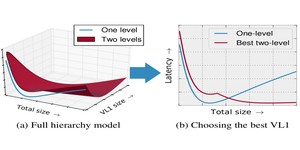
Researchers at Rice University, Texas have stumbled on a technique for creating ultra-small digital switches, which they claim could lead to single chips that store as much data as the biggest hard drive within five years.
According to coverage of the breakthrough on The New York Times, the team of scientists are working on developing a new breed of digital switch that graduate researcher Jun Yao discovered by accident.
Based around silicon oxide, making adoption in today's silicon-driven chip foundries relatively straightforward, the new chips should be able to shrink to far smaller scales than current technology allows - although such developments have yet to be fully proven.
The team has succeeded in creating chips based around the technique, which uses filaments of silicon oxide just five nanometres thick, capable of storing 1Kb of data. While that isn't a great deal, the future potential is such that the team is predicting storage systems based around the technology to be able to store vast quantities of data in a single IC within five years, potentially allowing the technology to take over from traditional hard disks and even NAND-based solid-state devices.
The team has published its findings in the journal Nano Letters, where it will undergo peer review before hopefully being picked up by a major corporation for commercialisation.
Are you pleased to see that we might be able to keep Moore's Law on track for another few decades, or will it take more than a 1Kb chip in a lab to convince you that silicon oxide will form the chips of the future? Share your thoughts over in the forums
According to coverage of the breakthrough on The New York Times, the team of scientists are working on developing a new breed of digital switch that graduate researcher Jun Yao discovered by accident.
Based around silicon oxide, making adoption in today's silicon-driven chip foundries relatively straightforward, the new chips should be able to shrink to far smaller scales than current technology allows - although such developments have yet to be fully proven.
The team has succeeded in creating chips based around the technique, which uses filaments of silicon oxide just five nanometres thick, capable of storing 1Kb of data. While that isn't a great deal, the future potential is such that the team is predicting storage systems based around the technology to be able to store vast quantities of data in a single IC within five years, potentially allowing the technology to take over from traditional hard disks and even NAND-based solid-state devices.
The team has published its findings in the journal Nano Letters, where it will undergo peer review before hopefully being picked up by a major corporation for commercialisation.
Are you pleased to see that we might be able to keep Moore's Law on track for another few decades, or will it take more than a 1Kb chip in a lab to convince you that silicon oxide will form the chips of the future? Share your thoughts over in the forums

MSI MPG Velox 100R Chassis Review
October 14 2021 | 15:04








Want to comment? Please log in.